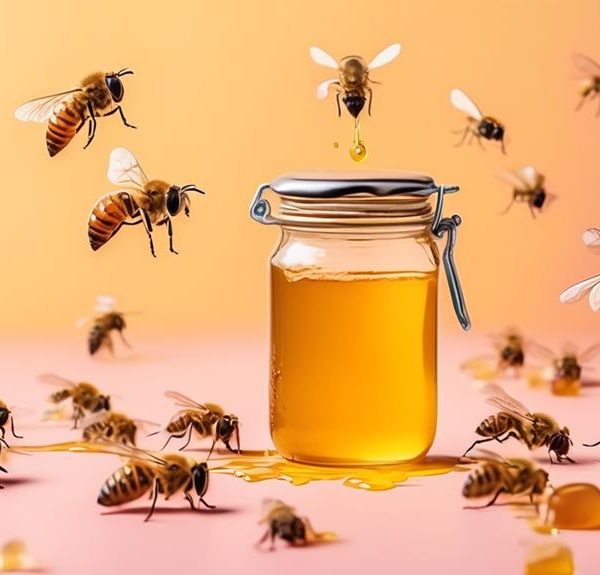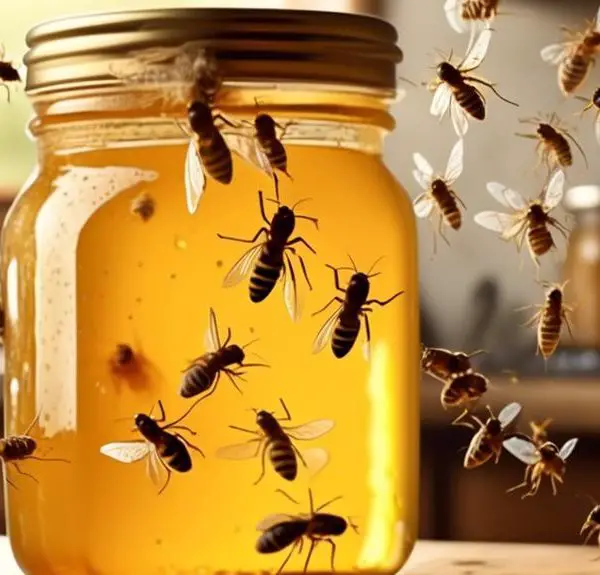Tempted to use honey to trap fruit flies? Discover the surprising truth and effective solutions for handling these tiny intruders.
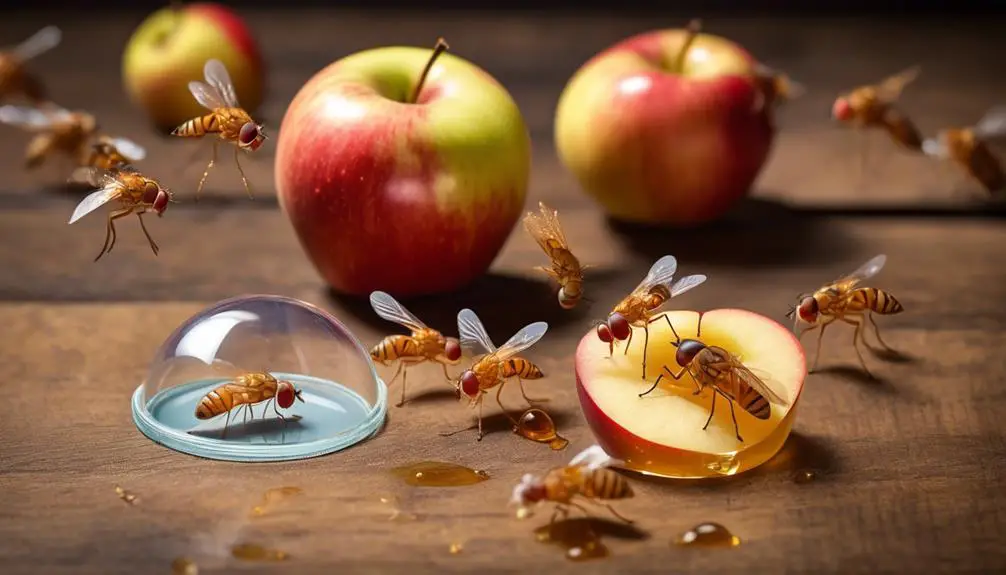
Are Fruit Flies Attracted to Honey?
'You know the old saying, 'you catch more flies with honey than vinegar'? Well, let's delve deeper into this notion, but this time we'll be focusing on a specific type of fly – the fruit fly.
You've probably noticed these pesky little creatures hovering around your kitchen, especially when there's ripe or rotting fruit in sight. But what about honey? Do these tiny insects have the same affinity for the sweet nectar that bears famously love?
The answer may surprise you, and understanding it could provide you with a new approach to handling these unwelcome guests.'
Key Takeaways
- Fruit flies are attracted to honey primarily due to its sweetness.
- The sticky texture of honey allows fruit flies to easily land and consume it.
- Honey's aroma, resembling decaying matter, is a significant factor in attracting fruit flies.
- Fruit flies' keen sense of smell plays a crucial role in detecting honey as a food source.
Understanding Fruit Fly Attractions
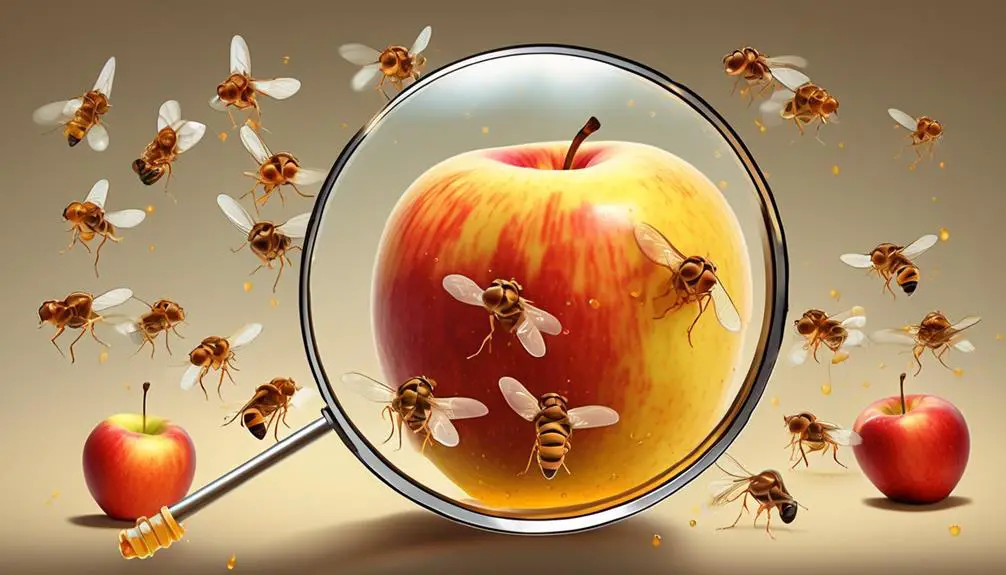
To fully grasp why fruit flies may be attracted to honey, it's crucial to dive into their biological tendencies and attractions. These tiny insects, known scientifically as Drosophila melanogaster, have an uncanny knack for finding the sweetest food sources in your home. You've likely noticed this if you've ever left a ripe banana out too long.
On a scientific level, fruit flies are equipped with a keen sense of smell, thanks to their antennae laden with olfactory receptors. These receptors are specific to certain smells, particularly those emanating from fermenting or decaying organic matter, which is a primary food source for them. Honey, with its high sugar content, emits a similar scent profile, making it an attractive target.
Moreover, fruit flies aren't just attracted to the scent of honey, but also its texture and color. The sticky, viscous nature of honey allows the flies to easily land and consume it. In addition, the golden or amber color of honey may visually appeal to these insects.
The Science Behind Fruit Flies
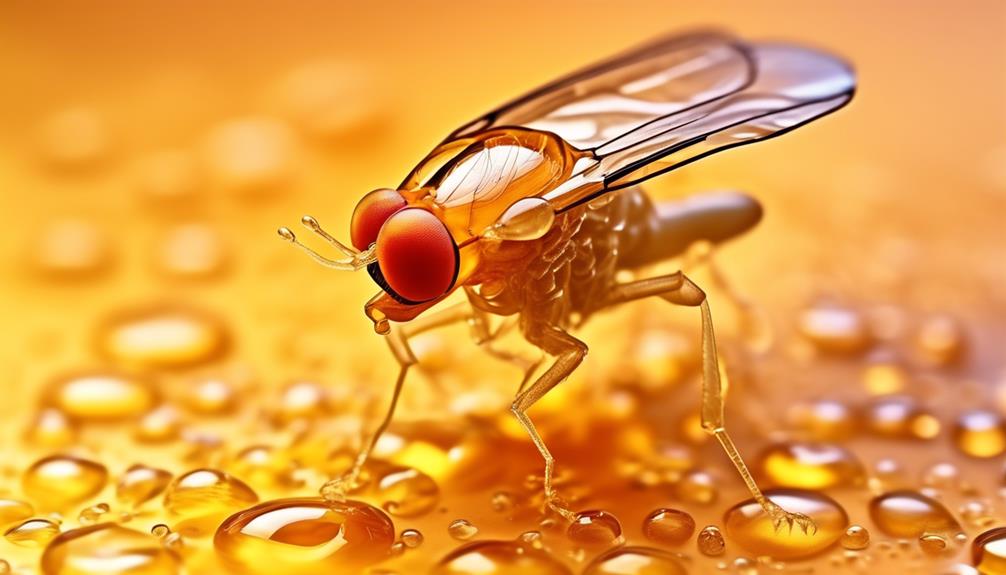
While understanding why honey may appeal to fruit flies gives us some insight, it's also crucial to explore the broader scientific principles that govern these insects' behavior. Let's delve deeper into their biology, life cycle, and sensory systems.
Fruit flies, like other insects, have a fascinating biology. They reproduce rapidly, with females laying hundreds of eggs in just a few days, which hatch into larvae within 24 hours.
Stage | Duration | Description |
|---|---|---|
Egg | 24 Hours | Laid on ripe fruit, hatches into a larva |
Larva | 5 Days | Feeds on the fruit, grows rapidly |
Pupa | 4 Days | Stage of metamorphosis |
Adult | 2 Weeks | Reproductive stage, seeks out food sources |
Their sensory systems are also remarkable. Fruit flies have chemosensory organs to detect chemicals like the sugars in honey. They also have a keen sense of smell, used to locate ripe fruit for egg-laying. Understanding these systems helps you see why they'd be drawn to the sweetness of honey.
In short, fruit flies are complex creatures, driven by biological instincts and sensory systems. Their attraction to honey isn't random, but a result of scientific processes.
Fruit Flies and Their Diet Preferences
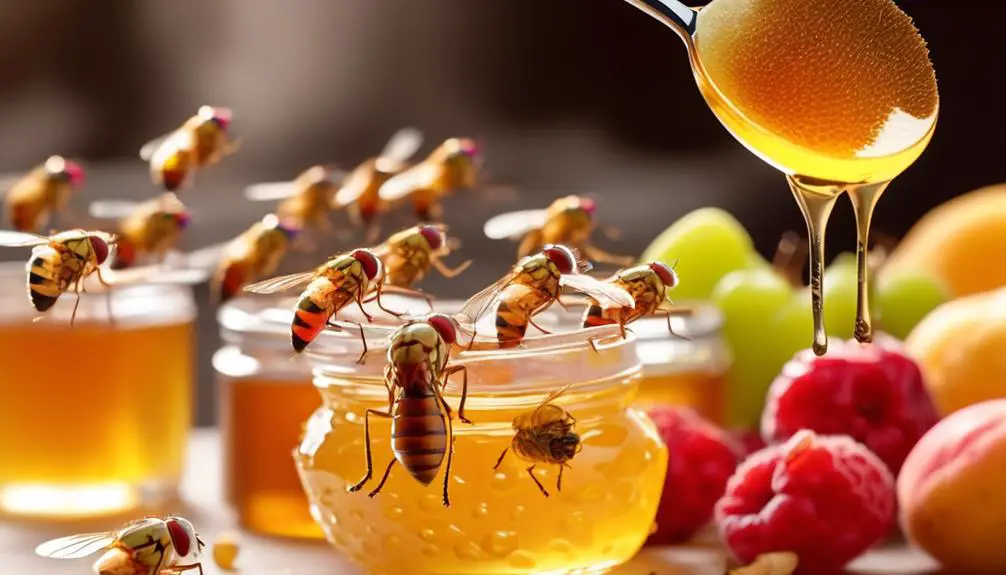
Diving into the dietary preferences of fruit flies, you'll find that their attraction to honey is just a small part of a much broader, scientifically fascinating story. Fruit flies, scientifically known as Drosophila melanogaster, are omnivorous by nature. This means they're attracted to a wide variety of food sources, not just honey.
Their main diet consists of decaying fruits and vegetables, where they lay their eggs. However, they're also drawn to sugary substances, including honey. The sugar content in honey provides the flies with a quick energy source, and its sticky texture aids in the retention of water, a crucial element for their survival.
Interestingly, fruit flies have a preference for fermented food, such as overripe fruits, due to their high levels of ethanol. Ethanol acts as a natural insecticide, killing off competing organisms and allowing fruit flies to safely consume and reproduce on these foods.
Further, research suggests that fruit flies are capable of altering their dietary preferences based on their needs. For instance, they're known to seek out protein-rich foods when they're about to reproduce. It's clear that the diet of fruit flies is far more complex than just an attraction to honey.
The Relationship Between Fruit Flies and Honey
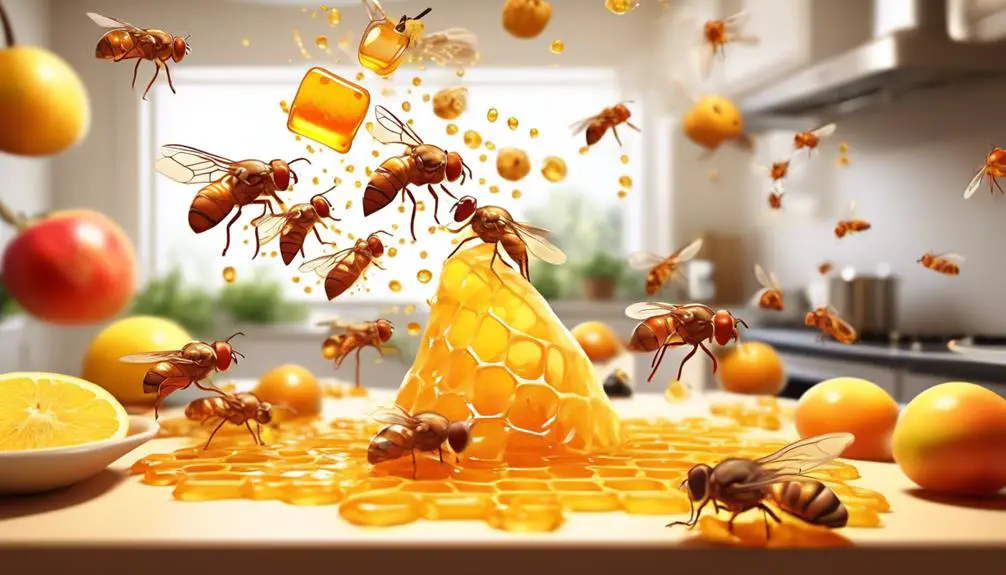
In understanding the intriguing relationship between fruit flies and honey, it's essential to delve into the characteristics of honey that make it attractive to these tiny insects. Honey is a sweet substance produced by bees from nectar, and it's this sweetness that fruit flies are primarily drawn to. The high sugar content in honey provides a ready source of energy for these insects.
Moreover, honey's sticky consistency might also play a role. Fruit flies are naturally attracted to rotting fruits because they provide a suitable environment for laying eggs. Honey, with its thick and sticky nature, could mimic this environment, thereby attracting fruit flies.
Now, let's consider the scientific angle. Fruit flies possess a highly developed olfactory system, enabling them to detect odors from afar. Honey, with its distinct aroma, could potentially be a strong attractant for these insects. Furthermore, research suggests that fruit flies are attracted to the yeast that often grows on honey, as yeast is a vital part of their diet.
Measures to Deter Fruit Flies From Honey
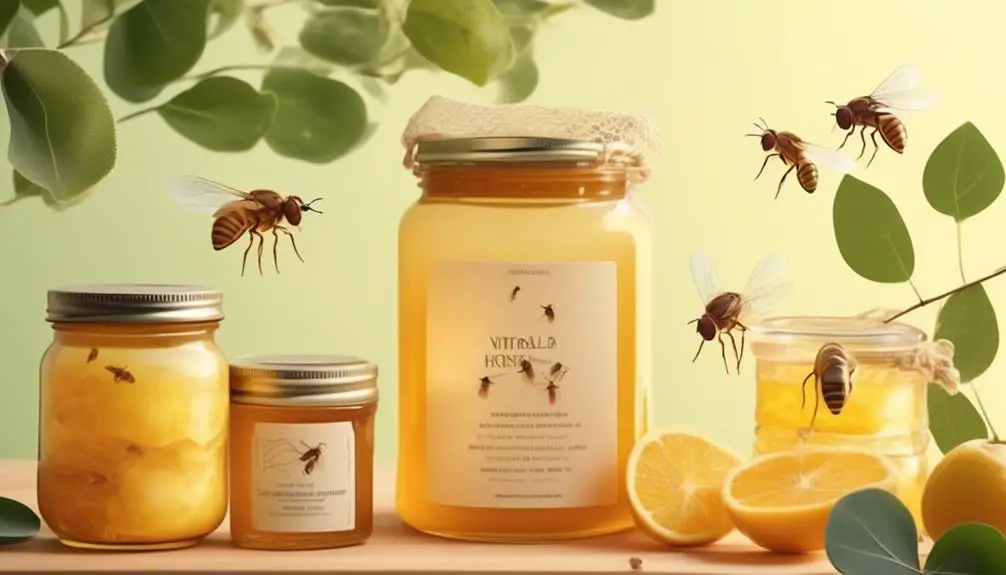
You might be wondering how to keep fruit flies away from your honey, and the good news is that there are several scientifically-backed measures you can apply. The first step is to ensure that your honey storage is airtight. Fruit flies are attracted to the sweet scent of honey, so by eliminating their ability to smell it, you reduce their interest.
The use of traps is another effective method. You can create a simple trap by mixing honey with vinegar in a container and covering it with a perforated lid. The fruit flies are attracted to the mixture, enter the container and can't escape.
Here's a quick guide:
Measure | Description |
|---|---|
Airtight Storage | Prevents scent of honey from attracting fruit flies |
Traps | Attracts and traps fruit flies, preventing them from reaching the honey |
Insecticides are another option, although they require careful handling to avoid contaminating the honey. Remember to always clean up after any food preparation, as this can attract fruit flies.
Conclusion
So, you've learned that fruit flies are indeed attracted to honey due to its sweetness and fermentation potential. Their preference for ripe, decaying fruits extends to honey's sugary allure.
However, effective measures can deter these tiny pests from invading your honey jars. By understanding their behaviors and dietary inclinations, you're now equipped to protect your sweet delights from fruit fly invasions.
Knowledge, as always, is the first step towards effective control.

